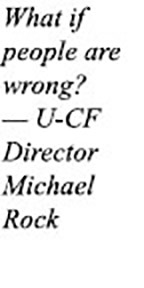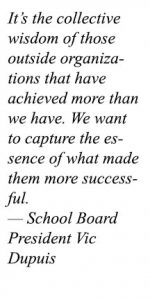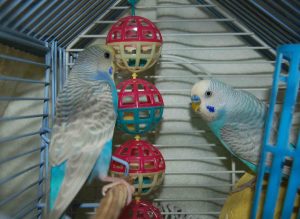The idea of developing a strategic plan for the Unionville-Chadds Ford School District has been bandied about for two years. In two months, those intermittent discussions might move into an action phase.
The board is scheduled to vote in June on whether to retain the services of the firm Demosophia to help generate the plan. Demosophia’s proposal would cost the district $52,500, according to the company’s proposal to the district.
Andy Hegedus, of Demosophia, briefed the school board directors during their April 18 meeting on what his firm can do to help create the plan. However, Hegedus first explained the name of the company, saying it’s a made-up word meaning “wisdom of the people” based on the Greek roots demo, meaning people, and sophia, meaning wisdom.
That meaning also relates to the process of how Demosophia goes about its business. Hegedus said the company brings in members of the community to determine what an organization needs to be done, defining what he called the “wicked problem.”
He defined wicked problem as an idea or concept that the district would like to address, its top priority or goal, not necessarily a problem. It’s also an area where work will never be finished.
“It’s something you’ll always be looking to improve,” he said, explaining that education is never fixed, that educators are always looking to improve how to educate.
His company’s procedure is to find a way to go from the wicked problem to noteworthy improvement. Part of that procedure to gather all the stakeholders — teachers, administrators, businesspeople and residents — to define what needs to be done and then find a way to accomplish the goal.
“Our process looks to energize the community and get robust community engagement…and by tapping into their wisdom in a really meaningful and important way that inspires commitment,” he said. Everybody buys in, he added, because they helped build it.
 Hegedus added that he wants to work on “important things, things that will move the district forward. We try to figure out where the leverage is. That’s where structured democratic dialogue comes in.”
Hegedus added that he wants to work on “important things, things that will move the district forward. We try to figure out where the leverage is. That’s where structured democratic dialogue comes in.”
He likened that part of the procedure to trying to solve a jigsaw puzzle without a box showing the final picture.
“You have lots of pieces. You know there’s a picture at the end, but you’re not quite sure what that picture is, and you’re not quite sure where to start,” he said. “That’s where we and the structured democratic dialogue come in.”
In this type of situation, the puzzle pieces are the various perceptions that people have. Without knowing all those pieces, he said, “you under-conceptualize” the problem. If that happens, the solution won’t be as powerful. The structured democratic dialogue brings all those pieces together, he said.
Demosophia has done a similar job for the Avon Grove School District, he said, and the people “self-nominated” to be part of the discussion. The company has also done work for Gallaudet University in Washington, D.C.
A few school board directors expressed skepticism.
Mike Rock asked what Avon Grove is doing differently because of its work with Demosophia. Hegedus said he’d rather not talk about Avon Grove because there have been issues in that district that “took them off the path…They did not have us help with implementation. They stopped at design.”
“What if the people are wrong,” Rock said. 
Hegedus responded by saying “When it comes to issues like this, right and wrong aren’t really known. Nobody really knows what’s right or wrong. It’s the best wisdom in the moment from the people that are there. And what’s your alternative?”
Director Steve Simonson asked: “At the end of the process, what does good look like? How do we know we’ve invested our resources and time in a productive activity?”
The answer was that the board and stakeholders would be presented with the information in a “very transparent way. You’ll see everything the entire community talked about,” Hegedus said.
Vic Dupuis, board president, said there is no “wicked problem” for the board to deal with. The goal is for the district to get to the next level of excellence.
“The collective wisdom of our stakeholders is what has gotten us to where we are. There’s collective wisdom that’s beyond our stakeholders. It’s the collective wisdom of those outside organizations that have achieved more than we have. We want to capture the essence of what made them more successful,” Dupuis said.
The response from Hegedus was that “expertise is best leveraged in trying to figure out how to move forward with specific issues, rather than engage in the conversation that’s in your context at this time.”
Carolyn Daniels asked how Demosophia gets fresh voices into a discussion.
Hegedus said his group uses online surveys, face-to-face interviews and telephone interviews.
Gregg Lindner said that if a group of 60 people volunteered, he could probably name 45 of them before he saw the list of names.
Superintendent John Sanville said the board would discuss the matter further during the May and June meetings, and then vote in June.
About Rich Schwartzman
Rich Schwartzman has been reporting on events in the greater Chadds Ford area since September 2001 when he became the founding editor of The Chadds Ford Post. In April 2009 he became managing editor of ChaddsFordLive. He is also an award-winning photographer.



How about the wicked problem being defined as aiding this district in becoming less numbers driven–grad rate, college admissions, standardized test results, number of students enrolled in courses above grade level–and more student-centered. Our students are more than the sum of their test scores and GPAs. Too much emphasis placed on resources for the academically talented and the learning challenged. Students in the middle need more attention.